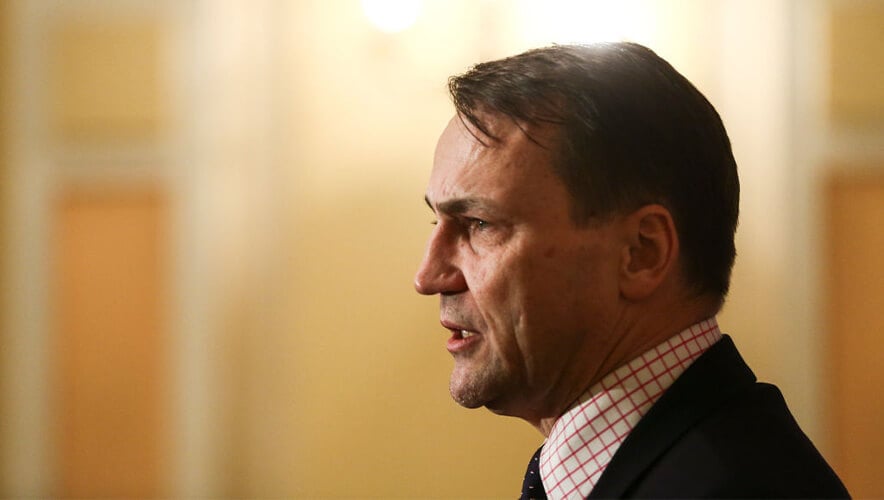Sikorski: Winning in Ukraine Offers Chance for Global Democratic Morale Boost
More than a year-and-a-half since Russia illegally invaded Ukraine, and following attempts to destabilize governments in Brazil, Burkina Faso, Niger, Peru, and Tunisia, democracy is at a turning point.
Global freedom has declined for the 17th consecutive year, according to the Freedom in the World 2023 report by Freedom House. Also concerning is that the gap between countries with registered improvements in their political rights and civil liberties and those with declines in these respective areas was the narrowest it has ever been in the past 17 years.
“The most serious setbacks for freedom and democracy were the result of war, coups, and attacks on democratic institutions by illiberal incumbents,” wrote Yana Gorokhovskaia, Adrian Shahbaz, and Amy Slipowitz in the Freedom House report. “The authoritarian regime in Russia launched a full-scale invasion of Ukraine in a bid to scuttle that country’s hard-won democratic progress.
“New coups and other attempts to undermine representative government destabilized Burkina Faso, Tunisia, Peru, and Brazil,” they continued. “Previous years’ coups and ongoing repression continued to diminish basic liberties in Guinea and constrain those in settings such as Turkey, Myanmar, and Thailand. Afghanistan’s Taliban regime barred girls from receiving an education in the midst of an ongoing economic and humanitarian crisis. Governments and occupying powers used violence and other means to destroy cultures and change the ethnic composition of populations in 21 countries and territories, including Ukraine, Ethiopia, and Myanmar.”
SponsoredSecurity and Surveillance Solutions Like No OtherAt GSX 2023, Hanwha Vision is showcasing an array of new products and solutions in Booth #3123 in Artificial Intelligence (AI) Hanwha stands at the forefront of AI innovation and will demonstrate new uses of AI in PTZ and Q series cameras, delivering precise detection, robust search capabilities, elevated data analysis, and enhanced image quality. Also on display will be FLEX AI technology machine learning which helps our cameras continually learn to recognize key objects for more efficient operation. |
Despite these regressions, the report’s authors noted that there were some positive signs that the “freedom recession” could be reaching a plateau, and democracy is poised for a comeback. Many nations studied in the report demonstrated that they had consolidated their democracy by holding competitive, but peaceful, elections. Nations also banded together to check autocrats' influence, especially when it comes to dealing with Russian President Vladimir Putin.
“Few of Vladimir Putin’s authoritarian allies have openly supported his war of aggression against Ukraine,” according to the report. Chinese Communist Party “leader Xi Jinping has not endorsed the invasion or provided military support despite describing the bilateral partnership as having ‘no limits’ early in 2022.”
One person involved in this effort is Radosław “Radek” Sikorski, member of the European Parliament representing the Kyavian-Pomeranian region of Poland and a 2023 general session speaker at GSX in Dallas, Texas.
Poland joined the North Atlantic Treaty Organization (NATO) in 1999 and the European Union in 2004, and it plays a strategic role in the security of Europe due to its location, economy, and the expansion of its military forces. It has also provided essential support to Ukraine’s government and military, while rallying international support to defeat Russia’s attempt to seize the nation through military force.
“Poland has in many ways set the standard for Europe’s humanitarian response to the Russian attack on Ukraine,” according to analysis from the Atlantic Council. “Since the invasion began, Poland has welcomed more Ukrainian refugees than any other European country, while also providing a range of benefits such as access to healthcare and education along with employment possibilities. During the past year, the Polish authorities have registered more than 1.5 million Ukrainian refugees.”
Poland has also been a leading contributor of military aid to Ukraine, sending tanks and weaponry, as well as helping build a global coalition to provide supplies and support to the Ukrainian military. It is also host to the American logistical operation assisting the Ukrainian war effort.
Working alongside these efforts is Sikorski, who in 2014 led the EU mission to Kyiv during the Maidan Revolution. He now sits on the Committee for Foreign Affairs and the Security and Defence Subcommittee at the European Parliament, and is the chairman of the delegation for relations with the United States. He’s visited Ukraine four times since the invasion, and he was preparing for a fifth visit when he spoke to the GSX Daily via Zoom.
“In general, Putin’s criminal invasion has reinforced our faith in our own values, and Ukraine has done better than I expected,” he says. “Europe has done better. The U.S. has done better, and Russia has done worse. But we just need to win it now.”
Prior to his MP role, Sikorski served as Poland’s minister of defense, foreign minister, and speaker of parliament. In the 1980s, he also worked as a war correspondent covering the Soviet Union’s invasion of Afghanistan. He was the first to produce photos of stinger missiles used during the conflict.
“For me having seen war at close quarters—afterwards it was Angola and Yugoslavia—has, I hope, given me an appreciation of what militaries can and cannot do, but also the stakes that are involved,” Sikorski explains. “It eased my relationships with generals when I was defense minister. They saw me as a civilian, but the civilian who feels the army.”
When asked how his prior career prepared him to meet the challenges of this moment, Sikorski says his early life experiences have similarities to the conflict we're seeing today.
“Over 35 years on it’s the same stingers and same helicopter gunships and the same Russian planes. It’s slightly déjà vu for me,” he adds. “Again, just as the Soviet Union bit too much off to chew in Afghanistan, so has Russia. On every metric of national power, Russia is getting weaker.”
And as the war in Ukraine continues and Russia diminishes, China is becoming the leader of the autocratic world and will pose a new security threat that Europe may not be ready to face yet. Sikorski has been watching the threat from China and recently wrote a piece published in Foreign Affairs on his concerns about Europe’s ability to counter that particular threat in the future.
His main motive in writing the piece, he explains, was to persuade Europeans that the circumstances that have resulted in a strong resistance to Russia’s current aggression may not exist when encountering future threats. Europe was fortunate that U.S. President Joe Biden did not take an isolationist approach to the conflict, nor was the United States caught up in a defense conflict of its own with China, Sikorski explains. The next time conflict breaks out in Europe, however, the continent may not be so lucky.
“There are two things we don’t control,” Sikorski says about Europe. “We don’t control who [the next U.S. president] will be, and we don’t control if—and when—China fulfills its pledge to re-integrate Taiwan by whatever means. If that happens, the United States might not necessarily be willing or able to help us deter Putin—or someone like Putin. Therefore, we should prepare to share the burden of defending the West’s perimeter much more actively than hitherto.”
This would mean Europe take a more active stance towards its security, including making major investments in defense—steps that some countries, including Germany, have already begun to take.
“If you want to be secure, you have to spend money. Defense is expensive. If you don’t spend the money, you will not get more security,” Sikorski says.
In his view, this means that countries should spend at least 2 percent of their national budget on defense. The European Union budget should also include defense spending, assessed in proportion to member nation’s GDP to make contributions more fair.
If you want to be secure, you have to spend money. Defense is expensive.
“If we agree in Europe that Putin is a challenge to all of Europe, then we should all contribute,” Sikorski says. “Obviously, the frontline states are the most exposed and are most likely to pay the ultimate price, but those that are more secure in the West and South should at least contribute the money. We have a defense budget now, but it’s far too small. It should be multiplied.”
Increasing security in Europe also means bolstering supply chains to make them more resilient and to produce more of the goods that Europeans need. This is especially important as tensions with China rise and the potential for sanctions or conflict with the country that is a major importer and exporter of goods around the world rises.
“Our cliff edge decoupling of Russia in the energy sector should also be a warning not to leave it to the last minute with China, because in China it’s not one sector but many sectors,” Sikorski adds. “It’s not just on imports, but also on the market and on technologies and on critical materials. We need to de-risk, in other words, not cut ourselves off but to bring dependencies down to an acceptable level.
“It’ll cost, but security always costs—whether its defense security or economic security,” he continues.
There also needs to be reinforcement of democracy, since after a rise in the 1990s the number of democracies and the depth of democratic governance around the world are now dropping, as evidenced in the Freedom House report.
This is due, in part, to globalization, the decline of traditional media, distrust in institutions, and increased polarization creating low social capital. Larger countries also have tended to struggle to meet their democratic ideals, partly because there is greater physical distance between the people and those elected to represent them, Sikorski adds.
There are also some political entrepreneurs who may take it upon themselves to destroy trust in institutions, denigrate institutions and call into question the civil servants who carry out the important work of a functioning government.
“The quality of our institutions, the commitment, the patriotism, the education, the honesty of people who work in those institutions is a very important thing for the rest of the economy,” Sikorski says. “This anti-state propaganda is, I think, intellectually and practically misdirected because I’ve been to places where the state almost doesn’t exist.”
Those places where a functioning state doesn't exist, Sikorski adds, are not usually great for business. Yet even those with a well-functioning government are not immune to challenges to the democratic state.
The United States “had your rebellion of 6th January, and we have rule of law problems in Poland and Hungary,” Sikorski adds. “We need to turn this around. My thesis is that winning in Ukraine will not only be strategically important, but also psychologically very important because we need to show that Western democracies can not only resist but can actually mobilize and prevail. That, I think, would restore our morale.”
In his general session speech at GSX 2023 in Dallas, Texas, Sikorski will share his insights into how democracy is under siege across the globe, highlight steps to be taken to secure democratic nations, and offer a new lens through which security professionals can view their role in this effort.
Sikorski will address GSX 2023 attendees at 8:15 a.m. CT on Monday, 11 September, in Hall F-Level 2 at the Kay Bailey Hutchison Convention Center in Dallas, Texas. His remarks are open to all GSX all-access pass holders.
Megan Gates is senior editor at Security Management and editor-in-chief of Security Technology and the GSX Daily. Connect with her at [email protected] or on LinkedIn. Follow her on Twitter or Threads: @mgngates.












